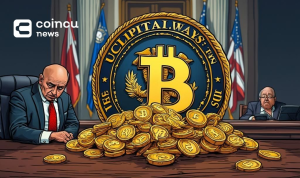$103870.68
At CoinCu News, we give both basic and in-depth articles on the latest news in the cryptocurrency and blockchain sectors.
Author
News
Polygon Co-founder Jordi Baylina Launches ZisK for Open-Source zkVM
Polygon’s zkEVM team forms ZisK, an independent zero-knowledge proving project focused on real-time, low-latency zkVM
Jun
DOJ Seizes USD 225 Million in Cryptocurrency Amid Digital Asset Crackdown
U.S. DOJ seizes USD 225 million in cryptocurrency, intensifying its crackdown on digital asset crime.
Jun
Paxos Launches Paxos Labs for On-Chain Financial Integration
Paxos announces Paxos Labs, aiming to integrate on-chain DeFi products for institutions.
Jun
Hacker Group Threatens Iranian Crypto Exchange with Data Leak
Gonjeshke Darande claims Nobitex hack, threatens data leak, citing sanctions evasion.
Jun
Senate Committee Advances Crypto Market Structure Act Proposal
U.S. Senate examines the principles of its Crypto Market Structure Act, led by Senator Cynthia
Jun
SkyBridge’s Scaramucci Criticizes Bitcoin Bond Issuance Strategy
Anthony Scaramucci voices concerns over Bitcoin bond issuance strategy at DigiAssets 2025, fearing potential harm
Jun
XRP ETF Debuts Strong on TSX—3iQ Sparks Crypto Access in Canada
3iQ launches XRP ETF (XRPQ) on TSX with 0% fees, offering secure XRP exposure to
Jun
BlackRock’s BUIDL Accepted as Crypto Collateral
Crypto.com and Deribit now accept BlackRock's BUIDL as collateral, enhancing institutional trading.
Jun
Bitcoin Holds $100K for 40 Days as Bull Pennant Signals Possible Breakout
Bitcoin trades above $100K for 40 days as a bull pennant forms, with low profits
Jun
[tptn_list how_old="7" limit="5" title_length="0" heading="0" show_date="0" ]
[tptn_list how_old="30" limit="5" title_length="0" heading="0" show_date="0" ]




















